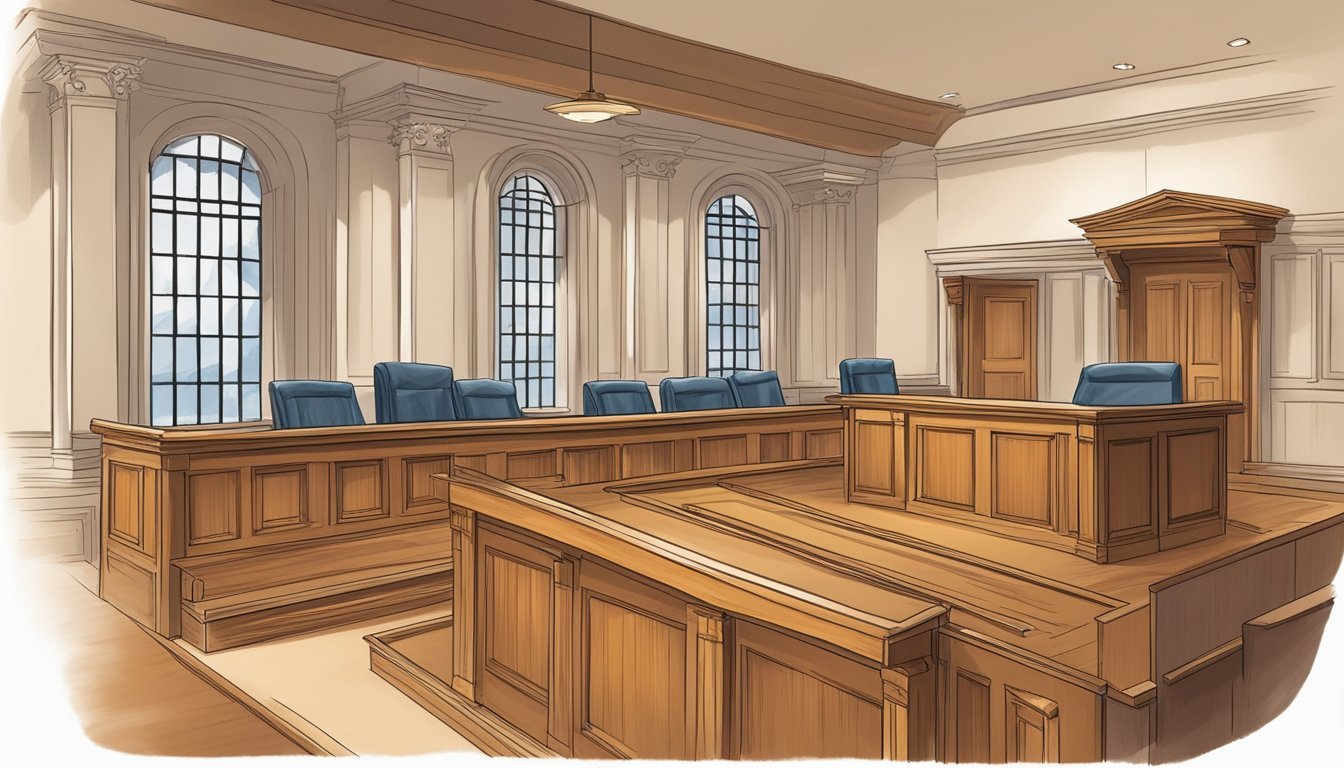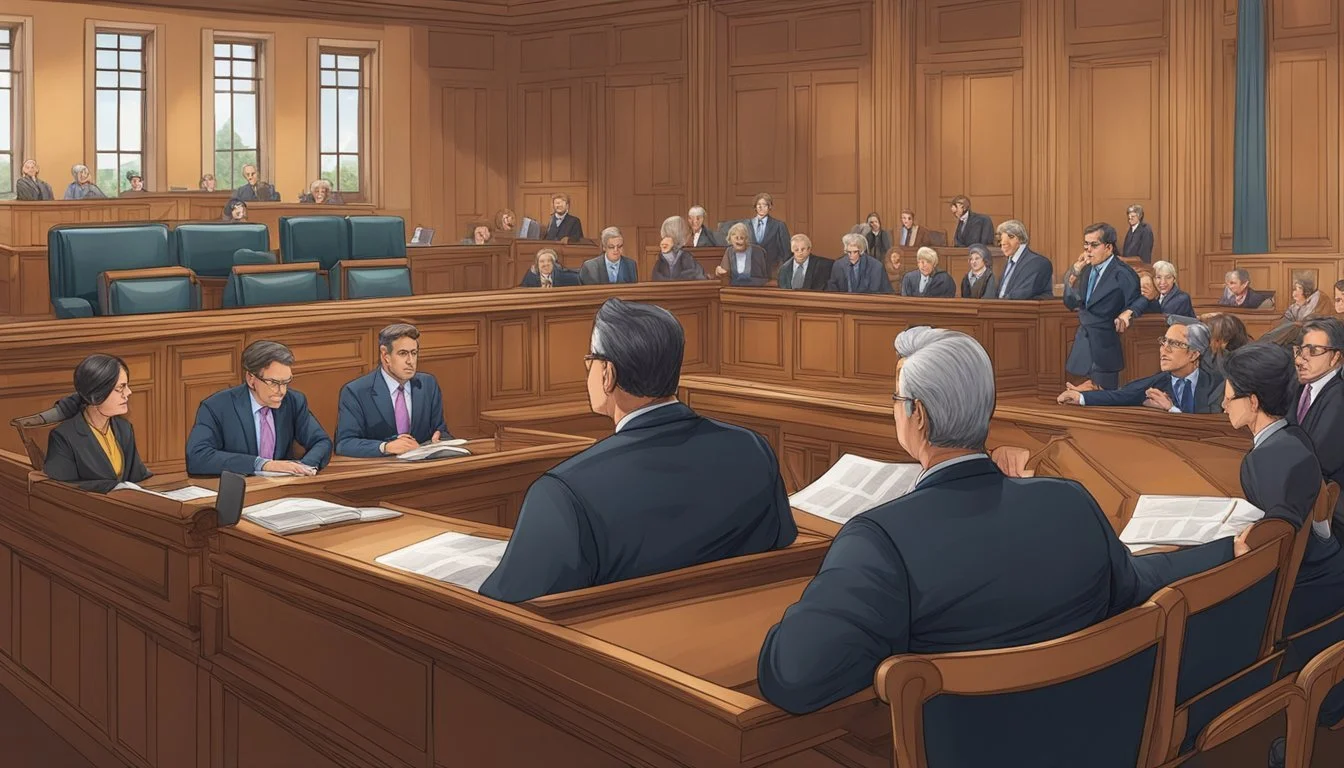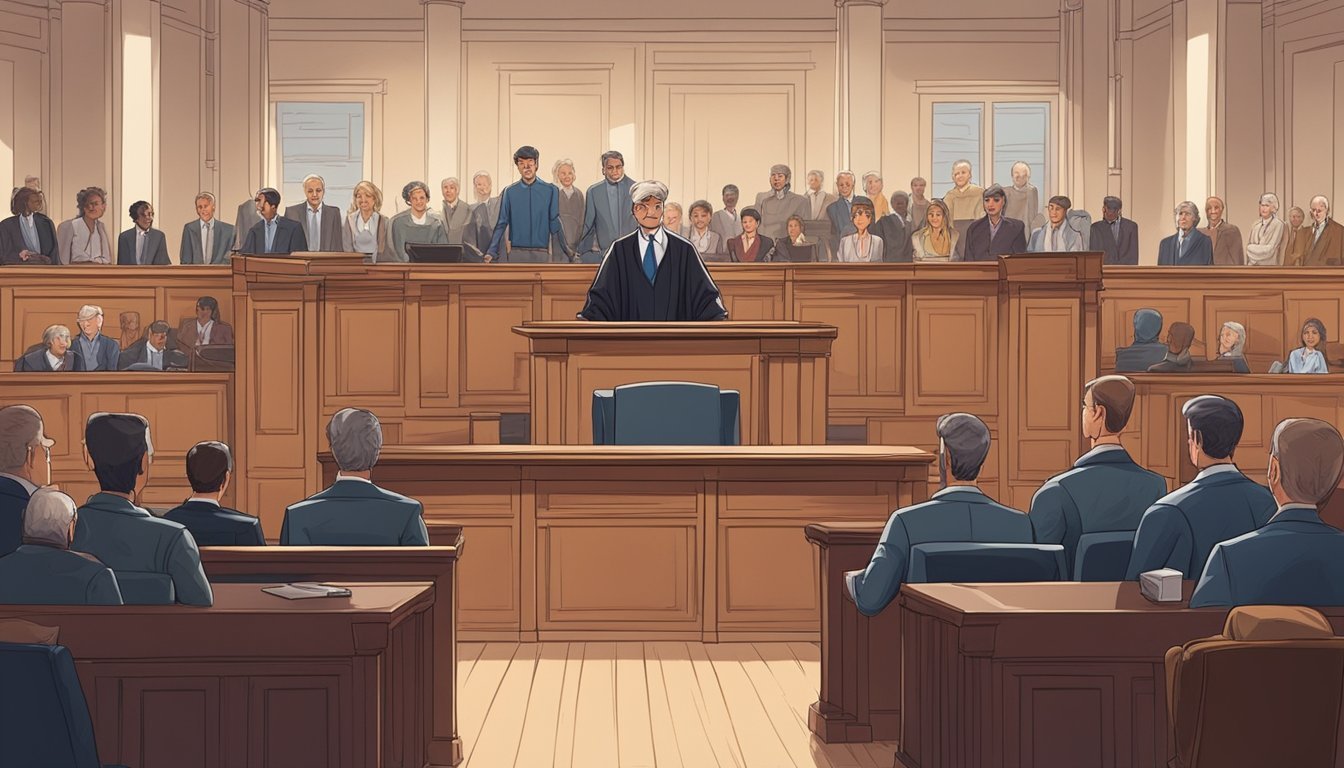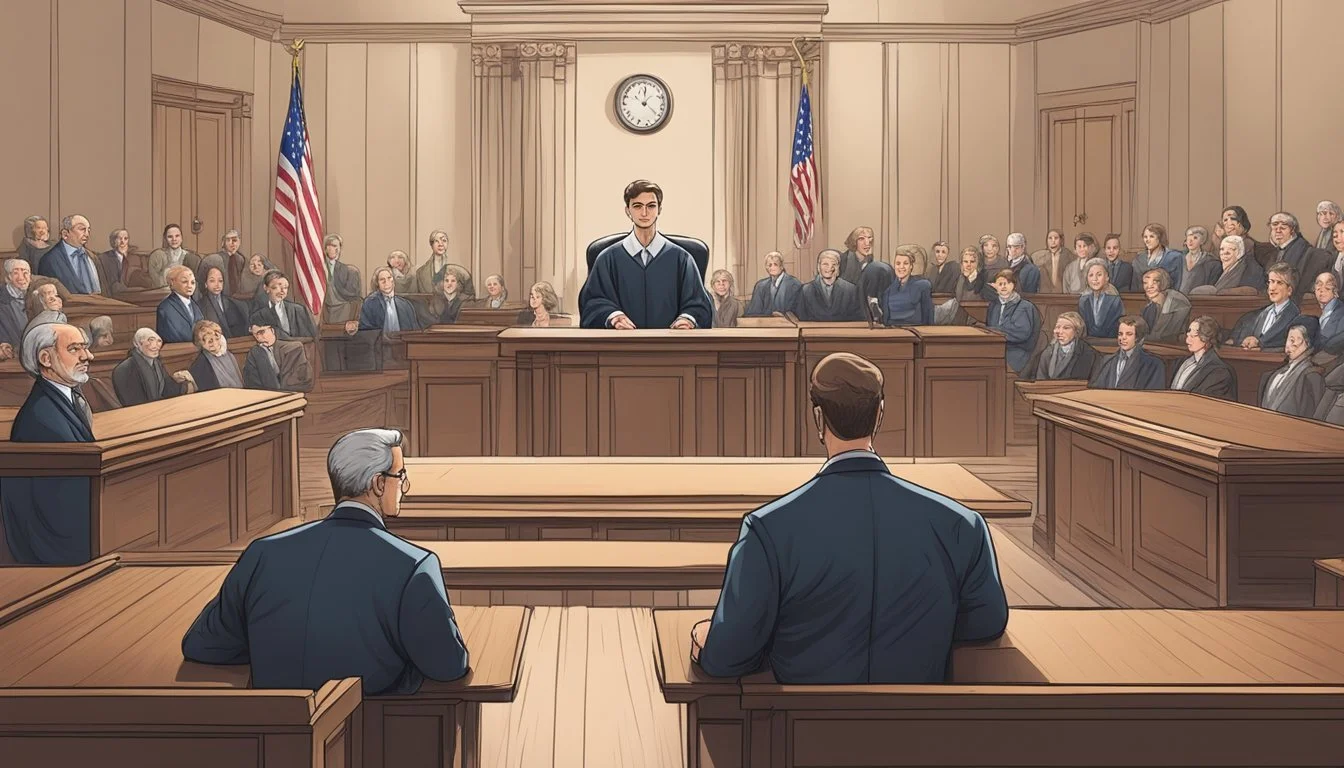The Actual Acquittal: Uncovering the Truth of A Few Good Men
Legal Analysis of the Iconic Film's Courtroom Drama
"A Few Good Men" captivated audiences with its gripping courtroom drama and unforgettable performances. While the film's portrayal of military justice and ethical dilemmas left a lasting impact, many viewers may not realize it was inspired by actual events.
The true story behind "A Few Good Men" unfolded at Guantanamo Bay in 1986. A hazing incident involving U.S. Marines resulted in severe injuries to one serviceman, rather than the death depicted in the movie. This real-life case prompted playwright Aaron Sorkin to craft a narrative that would later become the acclaimed film.
One of the Marines involved in the incident, David Cox, came forward after the movie's release to share his perspective. Cox, who joined the Marines out of high school in 1985, was stationed at Guantanamo Bay during the time of the hazing. His account provides valuable insight into the actual events that inspired Sorkin's fictional courtroom drama.
Context of 'A Few Good Men'
"A Few Good Men" emerged as a landmark legal drama, shaping cultural perceptions of military justice and courtroom proceedings. The film's impact extended beyond entertainment, influencing public discourse on authority, truth, and moral responsibility.
Cultural Impact
"A Few Good Men" left an indelible mark on popular culture. Its iconic line "You can't handle the truth!" became instantly recognizable, transcending the film itself. The movie sparked discussions about military ethics and the balance between duty and morality. It brought complex legal concepts to mainstream audiences, making courtroom drama more accessible and engaging. The film's exploration of power dynamics resonated with viewers, prompting reflection on institutional authority and individual conscience.
Legal Drama Genre Evolution
"A Few Good Men" revolutionized the legal drama genre. It elevated courtroom scenes from dry procedural affairs to riveting theatrical performances. The film blended intense legal maneuvering with character-driven storytelling, setting a new standard for the genre. It popularized the concept of the underdog lawyer taking on a powerful system, inspiring numerous subsequent works. The movie's tight pacing and dramatic reveals influenced how legal narratives were structured in both film and television. Its success paved the way for more nuanced and morally complex legal dramas in the years that followed.
Plot Synopsis and Overview
"A Few Good Men" centers on a court-martial case at Guantanamo Bay Naval Base. Two Marines, Lance Corporal Harold Dawson and Private First Class Louden Downey, are accused of murdering fellow Marine William Santiago.
Lieutenant Daniel Kaffee, a Navy lawyer known for plea bargains, is assigned to defend the accused. He initially aims for a quick deal but becomes intrigued by the case's complexities.
Kaffee is joined by Lieutenant Commander JoAnne Galloway and Lieutenant Sam Weinberg. They uncover evidence suggesting the defendants were following orders for a "Code Red" - an unofficial disciplinary action.
The team's investigation leads them to confront the base's commanding officer, Colonel Nathan Jessup. They suspect Jessup ordered the Code Red that resulted in Santiago's death.
The trial unfolds with intense courtroom exchanges. Kaffee employs bold tactics to expose the truth, culminating in a dramatic confrontation with Jessup on the witness stand.
As the story progresses, deeper themes emerge. The film explores military ethics, the nature of authority, and the conflict between following orders and moral responsibility.
Character Analysis
"A Few Good Men" features complex characters whose motivations and actions drive the plot forward. Their personalities and conflicts shape the narrative and provide depth to the legal drama.
Lieutenant Daniel Kaffee
Daniel Kaffee, portrayed by Tom Cruise, is a talented but unmotivated Navy lawyer. He initially prefers plea bargains to actual trials, avoiding challenging cases.
Kaffee's character arc shows significant growth throughout the film. He transforms from a laid-back attorney to a passionate advocate for justice.
His witty remarks and clever tactics in court demonstrate his intelligence and quick thinking. Kaffee's relationship with his father, a renowned lawyer, influences his approach to the case and his personal development.
Colonel Nathan R. Jessup
Jack Nicholson's portrayal of Colonel Jessup is iconic. Jessup is a high-ranking Marine officer with a commanding presence and unwavering belief in his authority.
He values order and discipline above all else, justifying his actions as necessary for national security. Jessup's famous line, "You can't handle the truth!" encapsulates his worldview.
His character represents the conflict between military culture and civilian values. Jessup's arrogance and sense of superiority ultimately lead to his downfall in the courtroom.
Lieutenant Commander JoAnne Galloway
Demi Moore plays JoAnne Galloway, a determined and principled Navy lawyer. She pushes for a thorough investigation of the case when others would prefer a quick resolution.
Galloway's expertise and dedication complement Kaffee's natural talent. She challenges him to take the case seriously and dig deeper into the truth.
Her character faces sexism within the military hierarchy but proves her worth through her legal acumen and unwavering commitment to justice. Galloway's presence adds depth to the film's exploration of military culture and ethics.
Critical Themes
"A Few Good Men" explores complex themes at the intersection of military culture, ethics, and justice. The film delves into the moral quandaries faced by those in uniform and the tension between following orders and doing what's right.
Military Ethics
The movie scrutinizes the ethical dilemmas inherent in military service. It questions the limits of obedience and the moral responsibility of soldiers. The characters grapple with conflicting loyalties to their superiors, fellow Marines, and personal values.
The film portrays the struggle between maintaining discipline and upholding human rights. It examines how rigid hierarchies can lead to abuse of power and the suppression of individual conscience.
The climactic courtroom scenes highlight the clash between military necessity and ethical conduct. This conflict forces viewers to consider the moral costs of national security.
Codes of Honor
"A Few Good Men" explores the concept of honor within military culture. It showcases how codes of conduct can both guide and constrain behavior.
The film illustrates the power of unwritten rules and traditions in shaping Marine Corps culture. These informal codes often supersede official regulations in day-to-day operations.
The characters' adherence to a strict code of honor becomes a double-edged sword. It fosters loyalty and sacrifice but can also lead to a dangerous insularity that resists outside scrutiny.
The movie challenges viewers to examine the true meaning of honor in the face of moral ambiguity.
Legal Versus Moral Responsibility
The film probes the gap between legal and moral culpability. It raises questions about who bears responsibility when following orders leads to harm.
The courtroom drama pits military law against broader ethical considerations. It explores how the unique context of military service complicates traditional notions of right and wrong.
The characters struggle with the conflict between their sworn duty and their personal sense of justice. This tension drives much of the plot and character development.
The film ultimately asks whether legal compliance is sufficient in the face of moral transgressions. It challenges viewers to consider their own moral obligations in complex situations.
Film Production Analysis
"A Few Good Men" showcases exceptional filmmaking craftsmanship. The production's success stems from its stellar cast, masterful direction, and powerful screenplay.
Casting Choices
Tom Cruise stars as Lt. Daniel Kaffee, delivering a compelling performance as the young, cocky lawyer. Jack Nicholson's portrayal of Col. Nathan Jessup is iconic, with his "You can't handle the truth!" line becoming one of cinema's most memorable moments.
Demi Moore brings depth to Lt. Cdr. JoAnne Galloway, while Kevin Bacon shines as Capt. Jack Ross. The supporting cast, including Kevin Pollak and Kiefer Sutherland, rounds out the ensemble with strong performances.
Director Rob Reiner's casting choices blend star power with acting prowess, creating a dynamic on-screen chemistry that elevates the film's intensity and emotional impact.
Direction and Cinematography
Rob Reiner's direction balances courtroom drama with character development. He expertly builds tension throughout the film, culminating in the electrifying final trial scene.
Cinematographer Robert Richardson employs a visual style that enhances the film's themes. The use of tight close-ups during intense dialogue exchanges amplifies the emotional weight of key scenes.
The film's pacing is deliberate, allowing for both quiet character moments and explosive confrontations. Reiner's staging of the courtroom scenes maintains energy and visual interest despite the static setting.
Script and Dialogues
Aaron Sorkin's screenplay, adapted from his own stage play, crackles with sharp dialogue and memorable lines. The script deftly balances legal jargon with accessible language, keeping audiences engaged.
Key exchanges between characters are layered with subtext, revealing motivations and conflicts. The film's exploration of honor, duty, and morality is woven seamlessly into the dialogue.
Sorkin's writing shines in the climactic courtroom scene, where rapid-fire exchanges build to a dramatic crescendo. The script's structure effectively sets up plot points and character arcs, paying off in satisfying ways throughout the film.
Historical Accuracy and Representations
"A Few Good Men" blends fact and fiction in its portrayal of military law and culture. While dramatized for the screen, the film incorporates authentic elements of military justice and procedures.
Military Law Accuracy
The film accurately depicts key aspects of military legal proceedings. Court-martial scenes show proper protocols, including the layout of the courtroom and roles of various participants. The questioning techniques used by lawyers reflect real military trial practices.
The movie correctly portrays the chain of command and its importance in military operations. It highlights how orders flow from superior officers to subordinates, a crucial element in understanding the case's central conflict.
The film also accurately represents the potential for tension between military culture and legal ethics. This is exemplified in the struggle between following orders and upholding moral standards.
Uniform Code of Military Justice
"A Few Good Men" references the Uniform Code of Military Justice (UCMJ), the foundation of U.S. military law. The film correctly depicts the UCMJ as governing the conduct of military personnel.
Key provisions of the UCMJ are accurately portrayed, including:
Article 92: Failure to obey an order or regulation
Article 134: General article covering conduct prejudicial to good order and discipline
The movie demonstrates how these articles apply in military justice, showing their real-world implications for service members.
The film also touches on the concept of non-judicial punishment, a less formal disciplinary process used in the military. This accurately reflects options available to commanders for addressing minor infractions.
Guantanamo Bay Setting
The movie's portrayal of Naval Base Guantanamo Bay (GITMO) is largely accurate. It correctly depicts the base's location in Cuba and its status as a U.S. military installation.
The film captures the isolated nature of GITMO and the unique challenges it presents for personnel stationed there. This includes limited contact with the outside world and the close-knit community that forms on base.
The tensions between U.S. forces and Cuban military are accurately represented. The movie shows the complex relationship between the two nations at this contentious border.
The film's depiction of daily life and routines at GITMO aligns with real accounts from service members stationed there. This includes recreational activities and the base's self-contained infrastructure.
The Acquittal in Focus
The trial's outcome hinged on a pivotal courtroom confrontation that exposed the truth behind the case. Strategic legal maneuvers and explosive testimony shaped the verdict's far-reaching consequences.
Examination of the Trial
The trial centered on two Marines accused of murdering a fellow soldier. Lieutenant Daniel Kaffee, portrayed by Tom Cruise, led the defense. His initial reluctance gave way to a determined pursuit of the truth.
Key witnesses included Colonel Nathan Jessup, played by Jack Nicholson. Jessup's testimony became the trial's turning point.
The prosecution built its case on the alleged "Code Red" order. This unofficial disciplinary action was at the heart of the controversy.
Courtroom Strategies Revealed
Kaffee's defense strategy evolved throughout the trial. He initially sought a plea bargain but later pushed for full acquittal.
His cross-examination techniques proved crucial. Kaffee used carefully crafted questions to expose inconsistencies in witness testimonies.
The climactic moment came during Jessup's interrogation. Kaffee's relentless questioning led to Jessup's infamous outburst: "You can't handle the truth!"
This admission shifted the entire case. It revealed that Jessup had ordered the Code Red, exonerating the defendants.
The Verdict's Implications
The acquittal of the two Marines reverberated beyond the courtroom. It exposed systemic issues within military culture and chain of command.
The verdict challenged the concept of blind obedience to orders. It highlighted the moral complexities faced by soldiers in following potentially unethical commands.
Legal experts debated the implications for military justice. The case set a precedent for questioning the actions of high-ranking officers.
Public perception of military discipline and accountability shifted. The trial sparked discussions on reform within the armed forces.
Public and Critical Reception
"A Few Good Men" garnered significant attention upon its release in 1992. The film achieved substantial box office success and received praise from critics and audiences alike.
Box Office Performance
"A Few Good Men" performed exceptionally well at the box office. The film grossed $141 million domestically and an additional $102 million internationally, bringing its total worldwide earnings to $243 million. This impressive financial performance solidified its status as a commercial success.
The movie opened strongly, debuting at number one in its first weekend. It maintained a steady presence in theaters for several months, benefiting from positive word-of-mouth and critical acclaim.
Critical Reviews
Critics responded favorably to "A Few Good Men." The film holds an 83% approval rating on Rotten Tomatoes, based on 66 reviews. Many reviewers praised the performances of Tom Cruise and Jack Nicholson, particularly highlighting their intense courtroom confrontation.
Roger Ebert awarded the film 3.5 out of 4 stars, commending its pacing and dialogue. Critics also applauded Rob Reiner's direction and Aaron Sorkin's screenplay, noting the film's ability to maintain tension throughout its runtime.
Audience Response
Audiences embraced "A Few Good Men" enthusiastically. The film resonated with viewers due to its compelling storyline, strong performances, and exploration of moral dilemmas within the military justice system.
Many moviegoers found the courtroom scenes particularly gripping, with Nicholson's "You can't handle the truth!" speech becoming an iconic moment in cinema history. The film's themes of honor, duty, and the pursuit of truth struck a chord with audiences.
"A Few Good Men" continues to be celebrated by fans, often appearing on lists of top legal dramas and military films. Its enduring popularity is evidenced by frequent television broadcasts and strong home video sales over the years.
The Film's Legacy
"A Few Good Men" left an indelible mark on cinema and society. Its iconic scenes and quotable dialogue permeated popular culture, while its exploration of military justice sparked discussions in legal circles.
Influence on Popular Culture
The film's most famous line, "You can't handle the truth!", delivered by Jack Nicholson, became instantly recognizable. It has been parodied and referenced countless times in TV shows, movies, and everyday conversations. The courtroom showdown between Tom Cruise and Nicholson is often cited as one of the most memorable scenes in cinema history.
The movie's portrayal of military life and courtroom drama inspired numerous legal and military-themed TV series and films. Its success also boosted the careers of its star-studded cast, solidifying Tom Cruise's status as a leading man and showcasing Jack Nicholson's dramatic range.
Impact on Legal Systems
"A Few Good Men" brought attention to the complexities of military justice and the Uniform Code of Military Justice (UCMJ). It sparked discussions among legal professionals about the balance between following orders and moral responsibility.
The film's depiction of court-martial proceedings, while dramatized, provided many viewers with their first glimpse into military legal processes. This increased public awareness of military law and its differences from civilian courts.
Some law schools have used scenes from the movie to illustrate legal concepts and courtroom tactics. The film's exploration of ethics in the military justice system has been a topic of debate in legal and military circles.
Ongoing Relevance in Media
More than three decades after its release, "A Few Good Men" continues to be referenced and analyzed in popular media. Its themes of honor, duty, and moral courage remain relevant in discussions about military ethics and leadership.
The film is often included in lists of top legal dramas and military movies. Its dialogue and performances are frequently studied in acting and screenwriting classes.
Documentaries and articles have explored the real-life events that inspired the story, comparing fact and fiction. The enduring interest in the film's backstory demonstrates its lasting impact on audiences and its ability to provoke thought about complex ethical issues.








